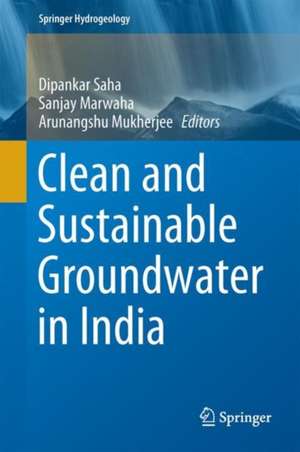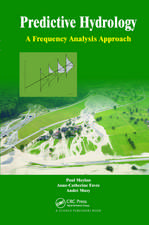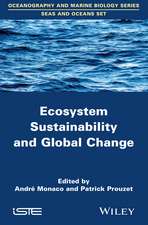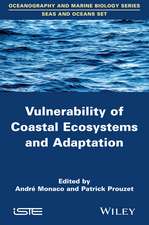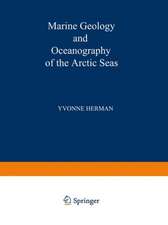Clean and Sustainable Groundwater in India: Springer Hydrogeology
Editat de Dipankar Saha, Sanjay Marwaha, Arunangshu Mukherjeeen Limba Engleză Hardback – 16 noi 2017
India, as a country, is the highest groundwater extractor in the world. Its service towards attaining the food and clean drinking water security is well documented. This volume addresses the issues of aquifer characterization, groundwater contamination, groundwater resource availability and its sustainable management through community participation in pan-India scenario. This book provides a unique opportunity for its readers to understand groundwater domain in India in its entire gamut. The papers included in the volume were selected carefully from the presentations made in the following four broad topics during the Manthan; (i) groundwater quality, (ii) conjunctive use of surface and groundwater, (iii) management intervention and sustainable use of this resource, and (iv) groundwater problems and application of various techniques.The book contains 20 papers including an introductory chapter by the editors. The content of the book is enriched by contributions from eminent researchers and activists in groundwater domain, like Prof. Tushar Shah, Prof. Himanshu Kulkarni, Dr. D. K. Chadha, Dr. Bharat Sharma and others. The recommendations in the individual papers are of immense significance for keeping the groundwater of the country clean and sustainable. The volume will help the readers to understand the groundwater issues of the country and also assist policy makers to prepare strategies for its better governance and management with environmentally sustainable ways.
| Toate formatele și edițiile | Preț | Express |
|---|---|---|
| Paperback (1) | 568.43 lei 38-45 zile | |
| Springer Nature Singapore – 30 ian 2019 | 568.43 lei 38-45 zile | |
| Hardback (1) | 649.06 lei 3-5 săpt. | |
| Springer Nature Singapore – 16 noi 2017 | 649.06 lei 3-5 săpt. |
Din seria Springer Hydrogeology
- 24%
 Preț: 795.36 lei
Preț: 795.36 lei - 24%
 Preț: 793.36 lei
Preț: 793.36 lei - 18%
 Preț: 963.91 lei
Preț: 963.91 lei - 15%
 Preț: 635.96 lei
Preț: 635.96 lei - 15%
 Preț: 637.59 lei
Preț: 637.59 lei - 15%
 Preț: 643.00 lei
Preț: 643.00 lei - 18%
 Preț: 1130.45 lei
Preț: 1130.45 lei - 18%
 Preț: 730.16 lei
Preț: 730.16 lei - 24%
 Preț: 874.52 lei
Preț: 874.52 lei - 15%
 Preț: 648.24 lei
Preț: 648.24 lei - 24%
 Preț: 1352.70 lei
Preț: 1352.70 lei -
 Preț: 389.11 lei
Preț: 389.11 lei - 24%
 Preț: 853.51 lei
Preț: 853.51 lei - 18%
 Preț: 900.80 lei
Preț: 900.80 lei - 18%
 Preț: 796.61 lei
Preț: 796.61 lei - 15%
 Preț: 587.39 lei
Preț: 587.39 lei - 15%
 Preț: 702.08 lei
Preț: 702.08 lei
Preț: 649.06 lei
Preț vechi: 763.60 lei
-15% Nou
Puncte Express: 974
Preț estimativ în valută:
124.19€ • 129.67$ • 102.79£
124.19€ • 129.67$ • 102.79£
Carte disponibilă
Livrare economică 14-28 martie
Preluare comenzi: 021 569.72.76
Specificații
ISBN-13: 9789811045516
ISBN-10: 9811045518
Pagini: 337
Ilustrații: XVI, 334 p. 143 illus., 126 illus. in color.
Dimensiuni: 155 x 235 x 23 mm
Greutate: 0.66 kg
Ediția:1st ed. 2018
Editura: Springer Nature Singapore
Colecția Springer
Seria Springer Hydrogeology
Locul publicării:Singapore, Singapore
ISBN-10: 9811045518
Pagini: 337
Ilustrații: XVI, 334 p. 143 illus., 126 illus. in color.
Dimensiuni: 155 x 235 x 23 mm
Greutate: 0.66 kg
Ediția:1st ed. 2018
Editura: Springer Nature Singapore
Colecția Springer
Seria Springer Hydrogeology
Locul publicării:Singapore, Singapore
Cuprins
1. Groundwater Resources and Sustainable Management Issues in India.- 2. Fluoride Contamination in Groundwater: A Pilot Study on Dug Well Recharge System for insitu Mitigation.- 3. Deciphering Freshwater/Saline Water Interface In and Around Northern Chennai Region, Southern India.- 4. Geogenic Fluoride Contamination in Two Diverse Geological Settings in West Bengal.- 5. Petro-geochemical Analysis and Their Correlation for Genesis of Fluoride Contamination in Groundwater of District Sonbhadra, UP, India.- 6. Hydrochemical Evaluation of Fluoride Rich Groundwater in Cherlapalli Watershed, a Fluorosis Endemic Area, Nalgonda District, Telangana State.- 7. Uranium Contamination of Groundwater in Southwest Parts of Punjab State, India with Special Reference to Role of Basement Granite.- 8. Conjunctive Use of Surface and Ground Water in Efficient Manner.- 9. Efficient Conjunctive Use of Surface and Groundwater can Prevent Seasonal Death of Non Glacier Linked Rivers in Groundwater Stressed Areas.- 10. Specific Yield of Unconfined Aquifers in Revisiting Efficiency of Groundwater Usage in Agricultural Systems.- 11. Towards a Managed Aquifer Recharge Strategy for Gujarat, India: An Economist’s Dialogue with Hydro-Geologists.- 12. Co-Solving Groundwater Depletion and Seasonal Flooding Through an Innovative Managed Aquifer Recharge Approach: Converting Pilot to a Regional Solution in the Ram Ganga Sub-Basin.- 13. Impact Assessment of Demonstrative Project on Artificial Recharge to Groundwater in Gangavalli Block, Salem District, Tamil Nadu.- 14. Soil Infiltration Test in Hard Rock Areas – A Case Study.- 15. Peoples’ Participation for Sustainable Groundwater Management.- 16. Geospatial Analysis of Groundwater Recharge and Irrigation Draft in Different Aquifer Systems of Rajasthan, India.- 17. Evaluation of Water Level Behavior in Coal-Mining Areas and its Adjacent Township and District Areas of Jharkhand State, India.- 18. Modelling the Potential Impact of Small-Scale Pumping Near Future Water Supply Wells in a Stressed Aquifer in South Western Bengal Basin on Groundwater Flow.- 19. Hydrodynamics of Groundwater Flow in the Arsenic Affected Areas of the Gangetic West Bengal, India.- 20. Recording High Natural Gamma Radiations in Fluoride Prone Area of Shivpuri District, Madhya Pradesh.
Notă biografică
Dipankar Saha is presently working as a Member in Central Ground Water Board, Ministry of Water Resources, River Development and Ganga Rejuvenation, Government of India. He is coordinating the ambitious National Aquifer Mapping and Management Programme taken up by Government of India to cover the entire country. He has more than 30 years experience in the domain of groundwater investigation, monitoring and assessment. He has obtained PhD on Groundwater Management from Indian School of Mines, Dhanbad. He has authored number of state and national reports and over 35 publications in peer reviewed international journals. He is professionally trained on Applied Quaternary Geology by Asian Institute of Technology, Bangkok and on Integrated Water Resources Management, by JICA, Tokyo. He has presented many keynote addresses at national and international level conferences including World Water Week – Stockholm. He is recipient of National Geoscience Award – 2011 on Groundwater Exploration and Groundwater Excellence Award in 2014, conferred by Government of India and International Association of Hydrogeologist – India Chapter, respectively.
Sanjay Marwaha is working as Regional Director with Central Ground Water Board, Ministry of Water Resources, GR & GR, Government of India. He has done his post-graduation from Panjab University, Chandigarh and was awarded University medals for standing First class First both in undergraduation and post-graduation. He had taken courses on Groundwater Management, Geographic Information System, and Remote Sensing at ITC, Netherlands, and was adjudged best trainee. During past 30 years, he is credited with number of studies related to various facets of groundwater, especially managed aquifer recharge in parts of semi-arid areas of country. He has been associated with compilation of five volumes issued by Government of India on various topics such as groundwater recharge - techniques, perspective plan of groundwater resources of India, master plan for artificial recharge in India, Punjab water Quality- Issues and Challenges. He has also authored more than 40 publications in national and international forums on various aspects of Hydrogeology. Currently, he is associated with one of the most ambitious projects ever taken for mapping of aquifers of India.
Arunangshu Mukherjee has obtained his MSc and PhD degrees from Pt. Ravishankar Shukla University of Raipur in Geology. A hydrogeologist by profession, he is working in Central Ground Water Board since last 23 years. He is actively engaged in research and teaching of Applied Groundwater aspects. He gained experience in management and implementation aspects of groundwater including application of computer models in scientific evaluation of hydrogeologic systems, groundwater resources development and protection. He has published over 70 research papers in international and national journals, and conference proceedings, authored many books and written more than 35 project reports. He is currently associated with arsenic research, spatial distribution of As-pollution in groundwater of hard rock areas. He is the recipient of “M P Young Scientist Award” 1990 and INC-IAH Award of Excellence in “Ground Water Implementation and Management” 2015. He is member of International Association of Hydrogeologist and National Cave Research and Protection Organization.
Sanjay Marwaha is working as Regional Director with Central Ground Water Board, Ministry of Water Resources, GR & GR, Government of India. He has done his post-graduation from Panjab University, Chandigarh and was awarded University medals for standing First class First both in undergraduation and post-graduation. He had taken courses on Groundwater Management, Geographic Information System, and Remote Sensing at ITC, Netherlands, and was adjudged best trainee. During past 30 years, he is credited with number of studies related to various facets of groundwater, especially managed aquifer recharge in parts of semi-arid areas of country. He has been associated with compilation of five volumes issued by Government of India on various topics such as groundwater recharge - techniques, perspective plan of groundwater resources of India, master plan for artificial recharge in India, Punjab water Quality- Issues and Challenges. He has also authored more than 40 publications in national and international forums on various aspects of Hydrogeology. Currently, he is associated with one of the most ambitious projects ever taken for mapping of aquifers of India.
Arunangshu Mukherjee has obtained his MSc and PhD degrees from Pt. Ravishankar Shukla University of Raipur in Geology. A hydrogeologist by profession, he is working in Central Ground Water Board since last 23 years. He is actively engaged in research and teaching of Applied Groundwater aspects. He gained experience in management and implementation aspects of groundwater including application of computer models in scientific evaluation of hydrogeologic systems, groundwater resources development and protection. He has published over 70 research papers in international and national journals, and conference proceedings, authored many books and written more than 35 project reports. He is currently associated with arsenic research, spatial distribution of As-pollution in groundwater of hard rock areas. He is the recipient of “M P Young Scientist Award” 1990 and INC-IAH Award of Excellence in “Ground Water Implementation and Management” 2015. He is member of International Association of Hydrogeologist and National Cave Research and Protection Organization.
Textul de pe ultima copertă
The book embodies the groundwater issues and challenges in India focusing its sustainable use. It is a compilation of papers presented by the eminent experts from Government departments, academia, research institutes, NGOs and stakeholders who assembled at Kurukshetra on 21st August, 2015 in the event of Bhujal Manthan or “Churning of Groundwater” organized for the first time by Ministry of Water Resources, River Development and Ganga Rejuvenation, the apex Ministry of Water Resource under Government of India.
India, as a country, is the highest groundwater extractor in the world. Its service towards attaining the food and clean drinking water security is well documented. This volume addresses the issues of aquifer characterization, groundwater contamination, groundwater resource availability and its sustainable management through community participation in pan-India scenario. This book provides a unique opportunity for its readers to understand groundwater domain in India in its entire gamut. The papers included in the volume were selected carefully from the presentations made in the following four broad topics during the Manthan; (i) groundwater quality, (ii) conjunctive use of surface and groundwater, (iii) management intervention and sustainable use of this resource, and (iv) groundwater problems and application of various techniques.The book contains 20 papers including an introductory chapter by the editors. The content of the book is enriched by contributions from eminent researchers and activists in groundwater domain, like Prof. Tushar Shah, Prof. K J Nath, Prof. Himanshu Kulkarni, Dr. D K Chadha, Dr. Bharat Sharma and others. The recommendations in the individual papers are of immense significance for keeping the groundwater of the country clean and sustainable. The volume will help the readers to understand the groundwater issues of the country and also assist policy makers to prepare strategies for its bettergovernance and management with environmentally sustainable ways.
India, as a country, is the highest groundwater extractor in the world. Its service towards attaining the food and clean drinking water security is well documented. This volume addresses the issues of aquifer characterization, groundwater contamination, groundwater resource availability and its sustainable management through community participation in pan-India scenario. This book provides a unique opportunity for its readers to understand groundwater domain in India in its entire gamut. The papers included in the volume were selected carefully from the presentations made in the following four broad topics during the Manthan; (i) groundwater quality, (ii) conjunctive use of surface and groundwater, (iii) management intervention and sustainable use of this resource, and (iv) groundwater problems and application of various techniques.The book contains 20 papers including an introductory chapter by the editors. The content of the book is enriched by contributions from eminent researchers and activists in groundwater domain, like Prof. Tushar Shah, Prof. K J Nath, Prof. Himanshu Kulkarni, Dr. D K Chadha, Dr. Bharat Sharma and others. The recommendations in the individual papers are of immense significance for keeping the groundwater of the country clean and sustainable. The volume will help the readers to understand the groundwater issues of the country and also assist policy makers to prepare strategies for its bettergovernance and management with environmentally sustainable ways.
Caracteristici
Deals with all aspects of ground water resource monitoring, evolution and management Presents recent data on ground water pollution and resource exploration Serves as reference material for researchers and policy makers Includes supplementary material: sn.pub/extras
